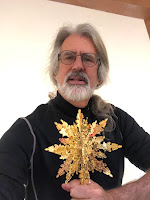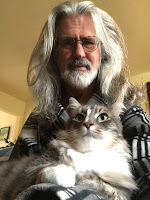Yesterday, Mark and I went to the Portland Art Museum. Mark wanted to revisit a exhibit of French painters from the 1890's (the Nabi Brotherhood) and I wanted to
revisit the Nefertari exhibit. Luckily, the weather cooperated and the drive was rainy and sunny instead of snowy and icy.
My impression that the Nefertari displays were oddly lit and poorly placed was reinforced during this second visit. Several items were clearly meant to be seen from behind and were shoved against walls; coffin lids were placed next to each other so that one side was not accessable -- perhaps the museum's rectangular galleries constrained the displays, or maybe the curators wanted the best layout for minimizing COVID exposure.
However, this time around there were fewer patrons thronging the halls, so I had more time to appreciate and photograph the New Kingdom artifacts. Mark put it the best: the exhibit is more more scholarly and archeological than it is artistic (sort of like one of those back study rooms at the MET); and reviewing my photos, many of them are studies in in form that I would refer to if I were designing graphics with Middle- and Late-Kingdom Egyptian motifs.
Thinking back, my favorite pieces from the exhibit were the sculptures of Sekhmet, the lion goddess (Mark and I had a fun time looking at the ways the manes were different and how some Sekhmets looked happy while others looked fierce); the sculptures of the king between Amun and Mut; and a cat sculpture.
Mark enjoyed the Nabi Brotherhood exhibit, especially some of the paintings of subjects interacting with their cats or dogs. I will admit to being a philistine when it comes to paintings--very often I'll look at portraiture and it's either not speaking to me, or it's Yet Another Madonna and Child, or it doesn't have a strong narrative I can access, or it's Yet Another Crucifixion, or it just plain looks like an assortment of colored textures, or Look! It's Boobs!--but I did appreciate some black-and-white prints.














